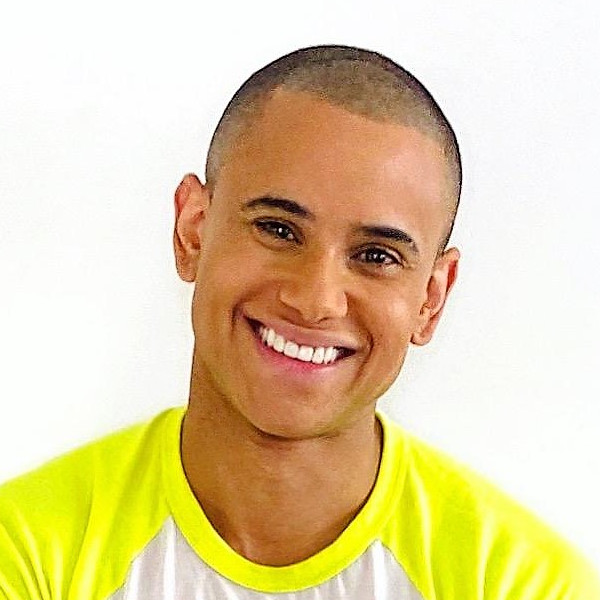Interviews with Olim
Each month, we interview an oleh or olah for our newsletter.
We invite you to read the stories of LGBTQ+ people who have made Israel their home.
"I had always loved coming here... I am a huge Zionist."
Interview date: December 2021
Q. Where were you born and where did you grow up?
A. I was born in Baltimore, Maryland. I grew up there, but also to a degree in New York. My father’s family is all in Maryland but my mother’s family is all in the New York City area. And although we all lived in Baltimore, only my mother’s side is Jewish. That meant that we would spend a lot of the holidays – sometimes even the whole month of September – with my grandmother in New York. I lived in New York for most of my adult life afterwards. Of note, my father’s side is largely Catholic; he was agnostic. My father’s side is African American and my mother’s is Ashkenazi.
Q. At what age did you come out? And how did it go?
A. I came out in stages. That is, I came out to certain friends and explored the gay world at around 23 and then slowly came out to certain family members. But in general, I would say 26. Age 26 is when I was out to the whole world, and of course in dramatic fashion. I started working for an LGBTQ+ organization simultaneously.
There is a YouTube video of me explaining my coming out story, actually. It’s a bit complicated to explain how it went. I had challenges with family and friends but at 26, I was independent enough to tolerate the blowback. I do love that many of my friends had been waiting for me to come out (for years) and their reactions were funny, so I try to focus on those.
Q. Were you involved at all in the LGBT community back home?
A. Yes. I fought the good fight for nearly a dozen years in the US as a volunteer/activist with various organizations. Of note, I am proud to have testified against conversion therapy in New York State and to have marched in so many Prides that my shoes literally fell apart. Some folks may also know me (or my name) from my many years of work as the national fundraiser for The Trevor Project.
Q. What is your involvement (if any) in the LGBT community in Israel?
A. I currently volunteer for TLVFest, the Tel Aviv LGBT Film Festival. We just finished our 16th festival, actually! I love the arts and storytelling. I am also active in LGBTQ+ advocacy efforts and community building through my work as a consultant for A Wider Bridge, the only nonprofit working to advance LGBTQ equality in both Israel and the United States .
Q. How long since you made Aliyah?
A. Just under two years ago. I consider myself part of the “Corona Aliyah.” I had about a month in Israel without corona…
Q. Did you move here on your own or with family/friends/significant other?
A. I moved here by myself with my French bulldog, Poppers. He has an instagram but it needs more pictures of him at the beach – which he prefers greatly over New York. My Instagram is @jasondanielfair and my dog’s is @poppersthefrenchie.
Q. Why did you make Aliyah?
A. The short answer is I had really done everything I wanted to do and see in the US and felt it was time to do chapter 2 of my life. The longer answer is that I had always loved coming here and Israel in general. I am a huge Zionist. I had considered aliyah in my 20’s, but decided against it. Fast forward to 2017, I went on an LGBTQ leadership mission with A Wider Bridge around Pride and got to see gay life, behind the scenes and up close, throughout the country. That trip allowed me to picture what living here would be like and so I had a newfound sense of comfort. My mother passed away roughly half a year before I made aliyah, and my father predeceased her by a few years too, so it was also a good opportunity if I were ever going to make aliyah… before I had other attachments in the US.
Q. How is it going so far?
A. I’m still here.
Q. What do you do in terms of work?
A. I have two areas of work, the arts and advocacy consulting. I principally work as a commercial/tv actor and a fitness model as well as private trainer. I am also currently working for A Wider Bridge as their Engagement Specialist. I work to strengthen connections between our alumni across the US with themselves and what’s going on in Israel.
Q. How is your Ivrit?
A. I am fluent/bilingual. My Hebrew is learned; I did not grow up speaking it at home. However, I learned how to read and write, like many American Jews, mostly for liturgical purposes. When I got to college, I went on Birthright, fell in love, and then studied Hebrew every semester until I graduated. I had opportunities to serve as a medic for Magen David Adom and took an ulpan at the University of Haifa during college breaks. I also worked for the Ministry of Tourism for a year after college.
I thought I was fluent during those years – but wow there is nothing like living here full time. I hadn’t used my Hebrew for about ten years before making aliyah but it was still there, thankfully. I also took Arabic in college and did a summer program here last year for it as well. I like languages 😉
Q. What has been your biggest challenge so far?
A. I don’t know about my biggest. It changes all the time. Life is always challenging, no? here is a short list: Israel is expensive, the bureaucracy is still hell on earth, the healthcare system is not made for queer folks, the men are often Neanderthals, and making friends during a pandemic. All that being said, I am a proud Israeli.
Q. How do you perceive the Israeli LGBT community?
A. We could be louder about equality here. That being said, I love the Israeli LGBT community. It is very much communal, perhaps due to its size. There are many gay sports groups, hiking groups, folks who like to go to parties, etc. There is a place for most folks in the community; I find it to be more “queer” than how the US tends to be segmented but we still have those challenges. I think our community is somewhat more integrated into straight communities than in the US, partly due to folks choosing to live closer to their families unlike in the US. We have less of the gayborhood phenomenon here. All of Tel Aviv is truly gay (but I live in an area that is extra gay).
Q. How is being LGBT in Israel different to back home?
A. Well, I am the same. I find that there is more ignorance/lack of awareness about the LGBTQ community in some pockets of the country. And at the same time, Israel has a very “live and let live” vibe…so in the periphery you could get stares or giggles if you held your boyfriend’s hand or you might get no one batting an eyelash for days. It really depends. The US is more predictable. In the US, there are the states and people you avoid and that is it (thanks to advocacy).
Q. If you were making aliyah now, would you do anything differently?
A. I spent a while thinking about this question and the answer is no. It takes a huge amount of work to make aliyah, as we all know. I had the benefit of speaking Hebrew and I still don’t think I could have squeezed any more knowledge or preparation into my process. The one note I will make is that I might have been even more conservative with money; the trouble is that I thought I was haha. But you don’t know how expensive things are going to get until they do and a pandemic hits.
Jason Daniel

Our Newsletter
Sign up if you would like to receive a monthly email listing events of interest to LGBT English-speakers in Israel, an interview with an oleh/olah and other useful information.
Want to be interviewed?
Complete the form below and we will get back to you.
Our Newsletter
Sign up if you would like to receive a monthly email listing events of interest to LGBT English-speakers in Israel, an interview with an oleh/olah and other useful information.
Want to be interviewed?
Complete the form below and we will get back to you.


